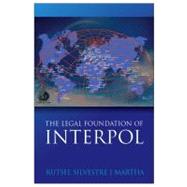
| Foreword Interpol Secretary General | p. vii |
| Preface | p. ix |
| Acknowledgments | p. xiii |
| Abbreviations | p. xix |
| Table of Cases | p. xxi |
| Introduction | p. 1 |
| The Concept Of International Organisations | p. 7 |
| The Object Of The Organisation | p. 13 |
| Is Extrajudicial Police Cooperation a Legitimate Object? | p. 15 |
| The Presumptive Freedom of Action of Sovereign States | p. 18 |
| The Indifference with regard to Forms and Formalities | p. 19 |
| Imputability of Police Enforcement Cooperation Actions to the State | p. 22 |
| The Doctrine of electa una via: Non-exclusivity of Mutual Assistance Arrangements | p. 24 |
| The Obligation to Cooperate | p. 26 |
| The Duty of Due Diligence in Policing | p. 26 |
| Conventional Undertakings to Cooperate in Police Enforcement Matters | p. 28 |
| Permissibility of Police Cooperation without the Formalities of Extradition or Mutual Assistance Treaties | p. 31 |
| Balancing Law Enforcement Needs and Fundamental Rights | p. 31 |
| Extrajudicial Surrender of Suspects and Fugitives | p. 32 |
| Extrajudicial Gathering of Evidence Abroad | p. 38 |
| The Appropriateness of Interpol's Aims | p. 42 |
| Organisation And Operations | p. 47 |
| Origins | p. 50 |
| Structure | p. 52 |
| The General Assembly | p. 53 |
| Subsidiary Bodies and Regional Conferences | p. 54 |
| Decision-making Procedure | p. 58 |
| Dispute Settlement Function | p. 62 |
| The Executive Committee | p. 66 |
| The General Secretariat | p. 69 |
| The National Central Bureaus | p. 74 |
| The Concept | p. 74 |
| NCB Service Standards | p. 76 |
| Legal Characterisation of NCBs | p. 79 |
| The Advisers | p. 91 |
| The Commission for the Control of Interpol's Files | p. 92 |
| The Exclusive Effect of the Commission's Competence | p. 92 |
| Remedies | p. 101 |
| Effects of Findings | p. 104 |
| Functions and Internal Legal Order | p. 105 |
| Essential Functions | p. 106 |
| Secure Global Police Communication Services | p. 106 |
| Operational Data Services and Databases | p. 109 |
| Operational Police Support Services | p. 113 |
| Training and Development | p. 123 |
| Internal Legal Order | p. 124 |
| Attribution and Delegation of Powers | p. 124 |
| Regulation of the Processing of Police Information | p. 127 |
| Regulation of the Employment Relations | p. 130 |
| Privileges and Immunities | p. 131 |
| Recognition | p. 136 |
| Recognition as an International Organisation | p. 138 |
| Recognition of its International Legal Capacity | p. 145 |
| The Will Of Governments To Create The Organisation | p. 149 |
| Relevance | p. 149 |
| Conduct of Police Bodies | p. 150 |
| Attribution of Police Conduct to Governments | p. 154 |
| Acceptance And Adherence To The Constitution | p. 159 |
| The Incorporators | p. 160 |
| Subsequent Adherents | p. 162 |
| Compliance | p. 165 |
| Members And Contracting Parties | p. 167 |
| Countries as Members | p. 171 |
| Are 'Countries' Subjects of International Law? | p. 174 |
| The Proper Law Of The Organisation | p. 179 |
| The Proper Law of Intergovernmental Legal Acts | p. 179 |
| Presumptive Exclusion of National Law | p. 180 |
| Distinguishing Interpol's Situation | p. 184 |
| Form And Formalities | p. 191 |
| The Irrelevant Distinction between Formal and Informal Agreements | p. 191 |
| The Issue of Registration and Publication | p. 195 |
| Conclusion | p. 199 |
| The Constitution of the International Criminal Police Commission, 1923 | p. 203 |
| The Constitution of the International Criminal Police Commission, 1939 | p. 205 |
| The Constitution of the International Criminal Police Commission, 1946 | p. 208 |
| The Constitution of the International Criminal Police Organisation and General Regulations, 1956 | p. 211 |
| Statement to Reaffirm the Independence and Political Neutrality of Interpol, 2006 | p. 226 |
| Bibliography | p. 229 |
| Index | p. 241 |
| Table of Contents provided by Ingram. All Rights Reserved. |
The New copy of this book will include any supplemental materials advertised. Please check the title of the book to determine if it should include any access cards, study guides, lab manuals, CDs, etc.
The Used, Rental and eBook copies of this book are not guaranteed to include any supplemental materials. Typically, only the book itself is included. This is true even if the title states it includes any access cards, study guides, lab manuals, CDs, etc.